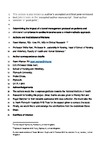Determining the impact of a bowel management protocol on patients and clinicians’ compliance in cardiac intensive care: a mixed-methods approach
| dc.contributor.author | Warren, D | |
| dc.contributor.author | Kent, B | |
| dc.date.accessioned | 2018-11-26T16:16:51Z | |
| dc.date.issued | 2019-01 | |
| dc.identifier.issn | 0962-1067 | |
| dc.identifier.issn | 1365-2702 | |
| dc.identifier.uri | http://hdl.handle.net/10026.1/12901 | |
| dc.description.abstract |
<jats:title>Abstract</jats:title><jats:sec><jats:title>Background</jats:title><jats:p>Bowel management protocols standardise care and, potentially, improve the incidence of diarrhoea and constipation in intensive care. However, little research exists reporting compliance with such protocols in intensive care throughout patients' stay. Furthermore, there is a limited exploration of the barriers and enablers to bowel management protocols following their implementation, an important aspect of improving compliance.</jats:p></jats:sec><jats:sec><jats:title>Aim and objective</jats:title><jats:p>To investigate the impact of a bowel management protocol on the incidence of constipation and diarrhoea, levels of compliance, and to explore the enablers and barriers associated with its use in intensive care.</jats:p></jats:sec><jats:sec><jats:title>Methods</jats:title><jats:p>A mixed‐methods study was conducted in cardiac intensive care using two phases: (a) a retrospective case review of patients' hospital notes, before and after the protocol implementation, establishing the levels of diarrhoea and constipation and levels of compliance; (b) focus groups involving users of the protocol, 6 months following its implementation, exploring the barriers and enablers in practice.</jats:p></jats:sec><jats:sec><jats:title>Results and findings</jats:title><jats:p>Fifty‐one patients' notes were reviewed during phase one: 30 pre‐implementation and 21 post‐implementation. Following the protocol implementation, there was a tendency for a higher incidence of constipation and less severe cases of diarrhoea. Overall compliance with the protocol was low (2.3%). However, there was evidence of behavioural change following protocol implementation, including less variation in aperients given and a shorter, less varied time period between starting enteral feed and administering aperients. Several themes emerged from the focus groups: barriers and enablers to the protocol characteristics and dissemination; barriers to bowel assessment; nurse as a barrier; medical involvement and protocol outcomes.</jats:p></jats:sec><jats:sec><jats:title>Conclusions</jats:title><jats:p>The bowel management protocol implementation generated some positive outcomes to bowel care practices. However, compliance was low and until there is improvement, through overcoming the barriers identified, the impact of such protocols in practice will remain largely unknown.</jats:p></jats:sec> | |
| dc.format.extent | 89-103 | |
| dc.format.medium | Print-Electronic | |
| dc.language | en | |
| dc.language.iso | en | |
| dc.publisher | Wiley | |
| dc.subject | bowel management | |
| dc.subject | compliance | |
| dc.subject | constipation | |
| dc.subject | diarrhoea | |
| dc.subject | intensive care | |
| dc.subject | mixed-methods | |
| dc.subject | practice changes | |
| dc.subject | protocol | |
| dc.title | Determining the impact of a bowel management protocol on patients and clinicians’ compliance in cardiac intensive care: a mixed-methods approach | |
| dc.type | journal-article | |
| dc.type | Journal Article | |
| plymouth.author-url | https://www.webofscience.com/api/gateway?GWVersion=2&SrcApp=PARTNER_APP&SrcAuth=LinksAMR&KeyUT=WOS:000453228000009&DestLinkType=FullRecord&DestApp=ALL_WOS&UsrCustomerID=11bb513d99f797142bcfeffcc58ea008 | |
| plymouth.issue | 1-2 | |
| plymouth.volume | 28 | |
| plymouth.publication-status | Published | |
| plymouth.journal | Journal of Clinical Nursing | |
| dc.identifier.doi | 10.1111/jocn.14669 | |
| plymouth.organisational-group | /Plymouth | |
| plymouth.organisational-group | /Plymouth/Faculty of Health | |
| plymouth.organisational-group | /Plymouth/Faculty of Health/School of Nursing and Midwifery | |
| plymouth.organisational-group | /Plymouth/REF 2021 Researchers by UoA | |
| plymouth.organisational-group | /Plymouth/REF 2021 Researchers by UoA/UoA03 Allied Health Professions, Dentistry, Nursing and Pharmacy | |
| plymouth.organisational-group | /Plymouth/Research Groups | |
| plymouth.organisational-group | /Plymouth/Research Groups/Institute of Health and Community | |
| plymouth.organisational-group | /Plymouth/Research Groups/Plymouth Institute of Health and Care Research (PIHR) | |
| plymouth.organisational-group | /Plymouth/Users by role | |
| plymouth.organisational-group | /Plymouth/Users by role/Academics | |
| dc.publisher.place | England | |
| dcterms.dateAccepted | 2018-08-29 | |
| dc.rights.embargodate | 2019-9-5 | |
| dc.identifier.eissn | 1365-2702 | |
| dc.rights.embargoperiod | Not known | |
| rioxxterms.versionofrecord | 10.1111/jocn.14669 | |
| rioxxterms.licenseref.uri | http://www.rioxx.net/licenses/all-rights-reserved | |
| rioxxterms.licenseref.startdate | 2019-01 | |
| rioxxterms.type | Journal Article/Review |


